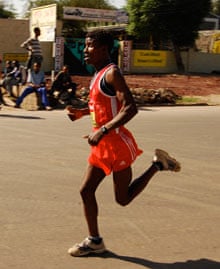I’m running along by the shore of a wide, glistening lake. Up ahead, a herd of horses are hauling themselves out of the water and crossing the path. The runner in front of me manages to skirt around one side, making the horses skip back. I spot my chance and nip through the same gap.
I’m running a half-marathon in Ethopia, the self-proclaimed “land of runners”. As I cross the finish line, the greatest distance-runner ever, Haile Gebrselassie. is standing there smiling, ready to shake my hand.
Ethiopia is Kenya’s northern neighbour and fierce athletics rival. Although Kenyans win more races and have more top athletes than anywhere else in the world, their dominance in distance running is seriously dented by a small group of super-fast Ethiopians. While the nation doesn’t have the same quantity of athletes or cover the same range of events (Kenyans regularly win medals at 400m and 800m too), the list of Ethiopian world-record holders and Olympic champions is testament to its running prowess.
Ethiopia has won the men’s 10,000m at the last four Olympics, and Ethiopian men currently hold the 5000m, 10,000m and marathon world records. Ethiopian women have also won four gold medals in the last three Olympics, compared to Kenya’s two.
So I’ve come to Ethiopia to run, too. And my first port of call is the town of Hawassa where, on the shores of the lake, Gebrselassie has built himself a huge luxury hotel, the Haile Resort. And it’s here that I’m undergoing the first test of my Kenyan training. After four months of chasing my tail around the steep hills of Iten, gasping like a dying man as I try to keep up with the Kenyans, I’m running the Every One half-marathon.

Sponsored by Save the Children, USAID and a host of other NGOs, this is a light-hearted charity race and there are lots of other non-Africans running. In fact, the pack seems to be made up mostly of aid workers, both Ethiopian and foreign, from Addis Ababa. The “elite” runners – 70 Ethiopians and one Kenyan – get to run their own race later, after our “mass race” is over.
To avoid the worst of the day’s heat, which descends early here in Hawassa, the event starts at 6.30am. After all my early morning runs in Kenya, it seems quite natural to be up and running at this time, so I’m feeling fairly sprightly as I do some last-minute limbering up on the start line.
And then with a blast of a hooter we’re off.
Almost immediately I find myself running on my own, with a lead group of about six runners pulling ahead while everyone else seems to have drifted away behind me. The course winds along a dirt track by the lake and then up and through the town. Lots of local people are out to cheer us on, clapping and shouting “bravo” as we go by – a remnant of a brief Italian occupation in the 1930s.
At one point the crowd gets very angry with an Ethiopian runner as I overtake him. I can hear them berating him behind me for a while but eventually, after I get far enough ahead, the general clapping and good-natured encouragement returns.
Halfway round the second of three laps, I catch a glimpse of my shadow on the tarmac road. I actually look like an athlete, striding away strongly along the wide avenue. Twelve kilometres done and I’m cruising.

By the time I pass the same point on the third lap, however, it’s not such a glorious sight. My stride length has shortened, my arms have stopped moving. I’m struggling with a stitch, which actually forces me to stop and do some stretching. It keeps coming and going. The slower I run, the better it is. Or is that just my mind playing tricks on me? I’m caught in a battle of wills between my desire to run as fast as I can, and my body’s desire to slow down.
My body, though, has co-opted my mind to its cause, and the desire to run fast is being drowned out by the rationalising chatter that tells me it doesn’t really matter what time I run, or where I finish, that I should just enjoy the experience, jog home, that I’ve tried hard enough already. Despite being talked down like this from pushing on too hard, I manage to keep on and cross the line in 7th place, in a personal best time of 1 hour 26 minutes and 47 seconds. The seconds are important, because it’s a best time by just seven seconds.
Gebrselassie greets me like a long-lost friend. I collect my medal and free T-shirt, and even get myself a quick massage, before heading off to find some breakfast.
So, after four months of training with the greatest runners in the world, I’ve knocked seven seconds off my best half-marathon time. I was really hoping for a bigger improvement than that. But then again, the race was run at an altitude of 5,500ft. I got a bad stitch. And just two days before it I was ill, recovering in my hotel room in Addis Ababa and being forced to watch the royal wedding by my children. So maybe it wasn’t so bad.
As for the elite race, it was won by Kimutai Kiplimo, the one Kenyan invited to the race as motivation for the Ethiopian runners to go faster. Another point to the Kenyans. They’re having a good year so far.
Source: Read Full Article
